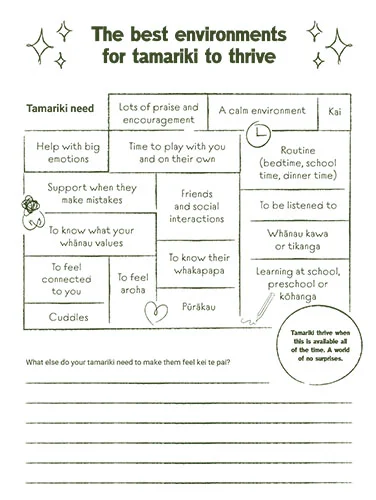
Positive experiences
Understanding how a baby's experiences affect their brain development.
Experiences and brain connections
Babies are born with almost all the brain cells (neurons) they’ll ever have. When they’re first born, very few of baby’s brain cells are connected to each other – most of the connections will form after birth.
Everything a baby sees, hears, smell, tastes and touches sends information to their brain and interacts with the baby’s genes to build connections. As experiences are repeated, the connections that are used become stronger. This happens for both positive and negative experiences.
Making strong connections
Strong connections become coated with a white, fatty substance called ‘myelin’, which makes the connections stronger and more efficient.
These connections are the ones that tend to be lasting – they build foundation pathways that can influence the rest of the child’s life. Connections that aren’t used often are weaker and may be ‘pruned’ away.
The quality and number of experiences a baby and child has in their early years ‘hard wires’ their brain.
Children who experience warm, loving relationships with the people who care for them, and have many positive experiences within the context of these relationships, are likely to develop a healthy brain. As their brain matures, it becomes less sensitive to their experiences and is less likely to change.
What children need to grow a healthy brain
- Children need to feel they’re special and loved.
- They need at least one loving parent or other close adult who can read their cues and respond consistently and sensitively.
- They need to be cuddled, sung to and rocked.
- They need a parent or close adult to talk with them, play with them and provide stimulating experiences appropriate to their age and interests.
- When they’re hurt, scared or anxious, they need a caring parent to comfort them and help them calm their ‘big’ feelings.
- As they grow, they need a parent close by to reassure them as they explore and learn about their world.
Repairing relationships, and resilience
No parent gets it right all the time. Sometimes there will be a break or misstep in their emotional connection with their child. At these times, parents can respond positively to ‘repair’ the relationship and put things right again.
For example, a parent may be exhausted after getting up to their child in the night and yells at them for spilling a drink. They can repair this break in their connection by cuddling them and saying, ‘I’m sorry I yelled at you. You were trying to hold your cup by yourself, weren’t you?’
When these breaks in connection are brief and the repairs are successful, this process of ‘putting things right’ (rupture and repair) may strengthen the relationship and help a small child develop trust and resilience. They learn that when things go wrong, they can usually be worked out in a positive way.
Experiences and memories
Positive relationships and experiences build memories that may be with baby for life. Even though babies are not likely to recall early memories of loving care, these memories are stored in a way that shape their expectations of future relationships and even shape how they’re likely to parent their own children.
Positive relationships and experiences build a foundation for a child’s future learning, behaviour and health. Children who have this are more likely to do well at school, have successful friendships, and be able to manage their emotions and behaviours.
Summary
- Experiences that are repeated over and over again strengthen connections in the brain — whether they’re positive or negative.
- Babies who experience positive relationships and experiences are likely to develop a healthy brain.
- Positive relationships and experiences in the early years build memories that shape how babies will parent their own children in future.












